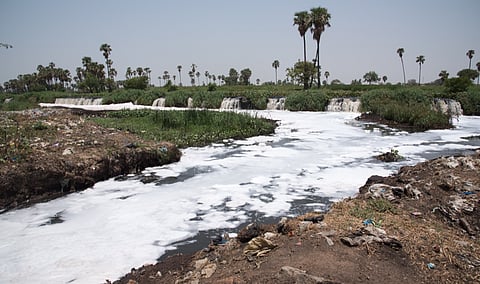Antibiotic pollution in Sirsa river flowing through Baddi pharma hub
Due to industrial waste being dumped into the Sirsa river that flows through Himachal Pradesh’s pharma hub of Baddi and Barotiwala, its water has a high content of ciprofloxacin class of drugs called quinolone antibiotics.
Ciprofloxacin is an antibiotic used to treat a number of bacterial infections, including bone and joint infections, intra-abdominal infections, respiratory tract infections, skin infections, typhoid fever, and urinary tract infections.
The India Veterans Forum for Transparency in Public Life, an NGO that is a constituent of the Consortium for Common Cause (CCC), has conducted a first-of-its-kind study to find out the level of pollutants in the form of discharge of antibiotics in the river in Baddi.
To begin with, the discharge of ciprofloxacin was studied. The study, pioneered by wing commander BNP Singh (retd), showed that the level of ciprofloxacin downstream was extremely high and, in some instances, bordering on 1,500 times the basic safe limits meant for such discharge.
Armed with the findings, the forum filed a petition before the National Green Tribunal (NGT) on June 24, 2020.
Hearing the matter, the NGT last year directed the authorities to constitute a task force and study the matter. As a result, the Himachal Pradesh Pollution Control Board (HPPCB) conducted followup tests and submitted its test reports to the NGT recently.
“The tests confirmed ciprofloxacin pollution in the river,” Major Kunwar Suresh Rana, the forum organising secretary, said.
The board submitted its report to the state government besides the NGT. Studies found contents of ciprofloxacin and directions have been sought from the Central Pollution Control Board on the permissible limits.
Impact of toxic discharge on human life
The HPPCB test reports also conclude that though there are no standards available for this kind of pollution, there are draft recommendations and by going through them, it can be easily inferred that pollution found in the river is 1,500 times the acceptable norms.
In the absence of any standards for evaluating the impact of the highly toxic discharge on human life, it is difficult to ascertain the health problems being faced by the population using the river water downstream and the natural seepage of the toxins into the groundwater table.
Disclaimer: This story has not been edited by Water Today staff and is generated from news feeds. Source: Hindustan Times

